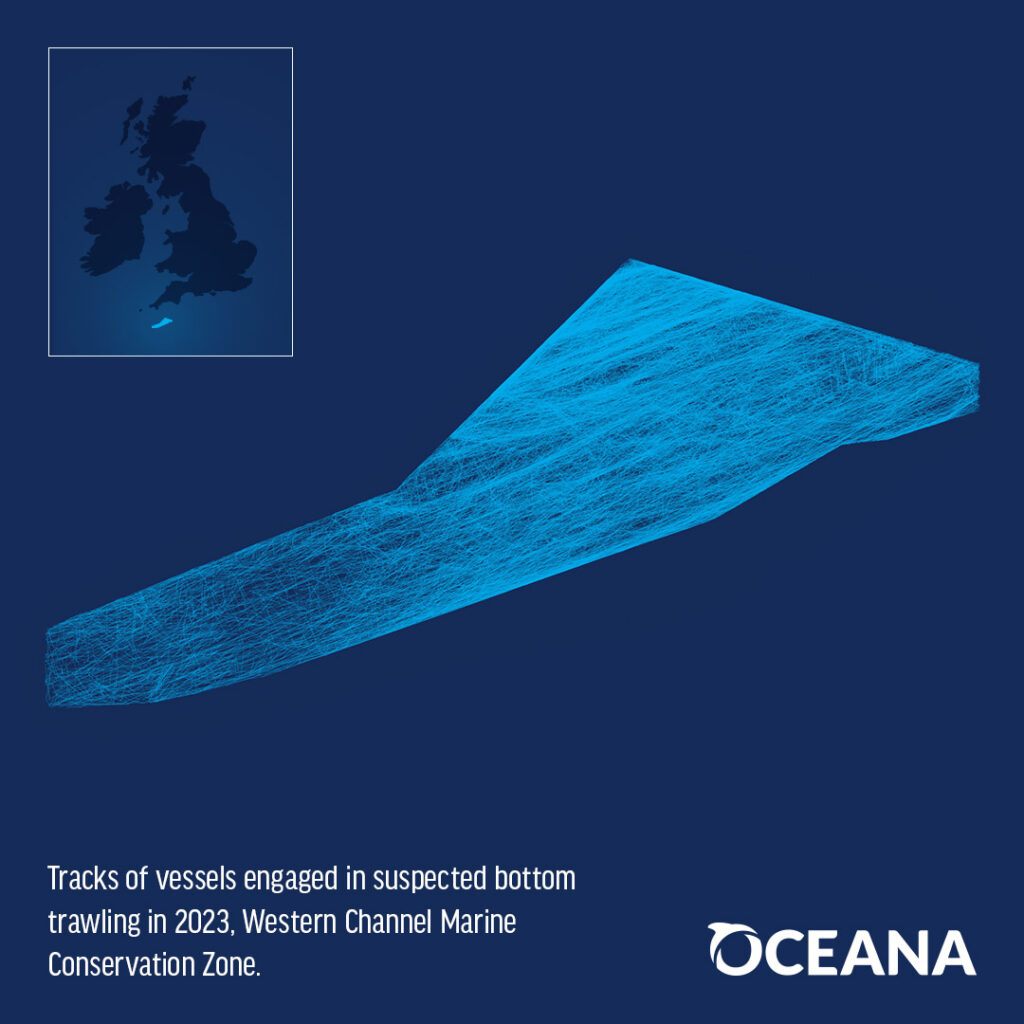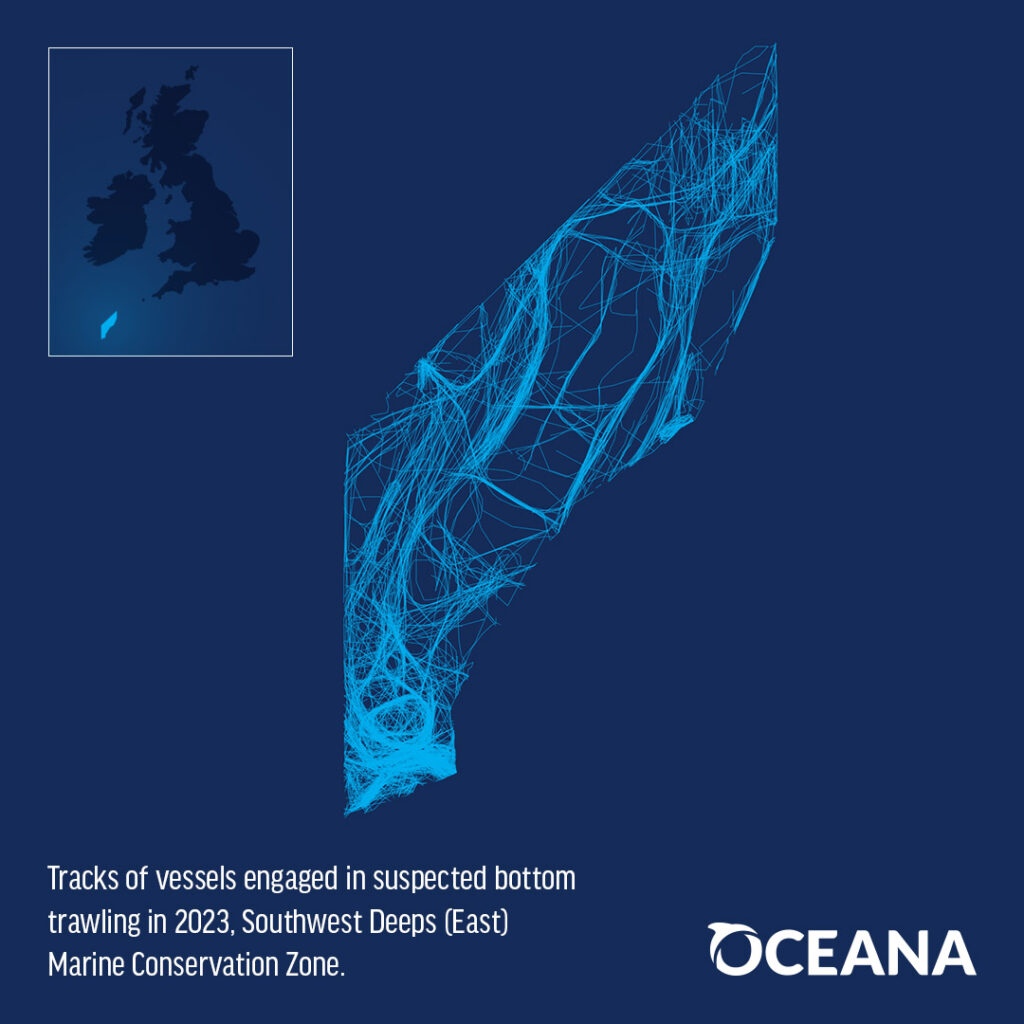The UK’s marine protected areas (MPAs) were exposed to over 33,000 hours of suspected bottom trawling in 2023, according to new analysis from Oceana UK.
The environment group used analysis of satellite data from Global Fishing Watch to show that over 100,000 hours of apparent industrial fishing took place within the UK’s offshore MPAs in 2023 – of which 33,000 hours were from vessels carrying bottom-towed gear, such as bottom trawls and dredges.
10 fishing vessels account for a quarter of activity
Oceana UK said that 10 fishing vessels were responsible for over a quarter (27%) of the suspected bottom trawling identified by the analysis. It went on to say that none of these 10 vessels were from the UK, and only 6% of the total 33,000-plus hours of suspected bottom trawling in these MPAs was carried out by UK vessels.
Hugo Tagholm, Executive Director of Oceana UK, said: “Our marine ‘protected’ areas are crisscrossed with the scars of this highly destructive form of fishing, which may take decades to heal. These areas are vital havens for ocean wildlife and protect us against the climate crisis. Everything from sharks to starfish are hoovered up by bottom trawling, which can destroy whole ecosystems and empty our seas of life.
Martin Attrill, Professor of Marine Ecology at Plymouth University, said: “Over a century of industrial bottom trawling and dredging has degraded the UK seabed and still threatens some of our remaining most important and sensitive marine habitats, impacting further the biodiversity and resilience of our seas. It is therefore frankly astounding that these harmful practices are still permitted in marine protected areas, designated to protect the seabed and allow nature to recover.”
Restrictions, reaction and political action on bottom trawling
The UK Government has committed to restricting bottom trawling in the UK’s offshore MPAs, and has been introducing byelaws to protect certain features within MPAs on a site-by-site basis, with four sites gaining increased protection in June 2022. One of these sites was the Dogger Bank MPA, which experienced a 98% decrease in bottom towed fishing since a ban was introduced, according to research by the Marine Conservation Society.
The latest of the byelaw restrictions is due to come into force on 22 March 2024. The Marine Management Organisation (MMO) is implementing a byelaw to protect marine habitats and species in 13 English offshore MPAs. The restrictions will prohibit the use of bottom towed fishing gear on features including rock, reef and associated biological communities.
At the time of the announcement of the consultation into restrictions at these 13 sites, Greenpeace said that ‘while steps to manage fishing in MPAs are welcome….. the government’s approach to reef protection doesn’t go far enough, as they’re not proposing site-wide bans and therefore don’t address the damage caused to the whole ecosystem’. Jean-Luc Solandt, at the Marine Conservation Society, said that the measures were “important progress” for some biodiversity but that “it is not enough”.
When the potential restrictions were announced, the National Federation of Fishermen’s Organisations (NFFO) cautioned any proposals to restrict access to fishing crews could affect fish supply. “Our principal concern is that the government hasn’t addressed our concerns about the cumulative impact of the scale of potential displacement of fishing activities, arising mainly from MPAs and the expansion of offshore wind,” said the then CEO of the NFFO, Barrie Deas, speaking to The Grocer.
Government response
The UK government, which committed to restricting bottom trawling in MPAs by 2024, is set to begin a consultation on measures for the majority of England’s offshore MPAs this spring.
A Defra spokesperson, speaking to the Guardian, said it was focused on stopping damaging fishing activity in all English MPAs. “We aim to have all necessary bylaws in place by the end of 2024, with further restrictions coming into force in 13 areas just this week.”
Cornwall biodiversity hotspots most at risk
The latest analysis from Oceana UK has focused on the UK’s 63 offshore benthic MPAs. These sites are located beyond 12 nautical miles of the coast, designated specifically for the importance of their seabed features.
According to Oceana UK’s analysis, the two most impacted sites were both located off the coast of Cornwall, the Western Channel MPA and the Southwest Deeps (East).
Oceana UK has been calling for political commitment for a complete ban on bottom trawling across all marine protected areas, with polling from the NGO showing that more than three quarters of the UK public support such a ban.
Tagholm went on to say: “The government must act now to ban this destructive practice from all our marine protected areas. Anything less is a complete betrayal of our ocean wildlife, which urgently need sanctuaries that are safe from this wholesale destruction.”
The full news release from Oceana UK can be read here.

